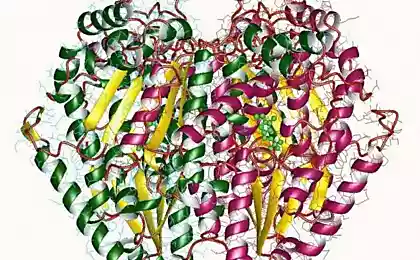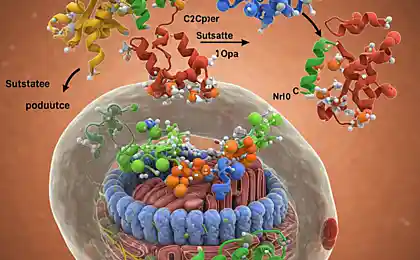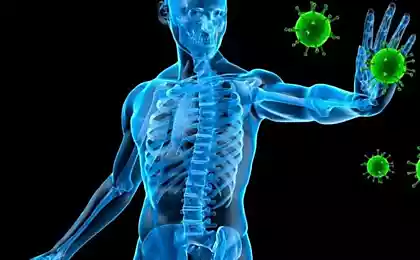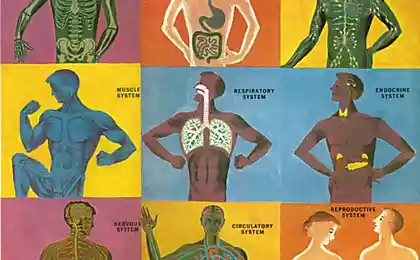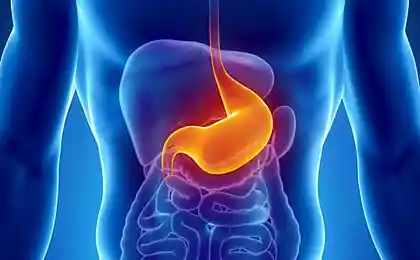716
Enzymes in the human body: IT is NECESSARY to know everyone!
Every day we eat a certain number rastitelnoe and animal food in order to learn from it, and that only the smallest particles of minerals, vitamins, fiber, building blocks for constructing proteins — amino acids, and energy. It is fundamentally important.
If we eat a piece of meat, we must understand that before you take out all his energy, vitamins, minerals and amino acids, we have this piece to process, assimilate, lead to a state that is available for our body to digest. This role in our body perform enzymes.
Seventeen million two hundred ten thousand one hundred fifty nine
Enzymes (enzymes) — this proteins that play a very important role in various biochemical processes in the body.They are necessary for digesting food, stimulating the brain activity, of energy processes of cells, restore organs and tissues.
The most important function of enzymes is to accelerate and activate the biochemical reactions in the body, many, if not most, of which are only in the presence of appropriate enzymes. The function of each enzyme is unique, ie each enzyme activates only one biochemical process. In this regard, in the body there are many enzymes — more than 3,000, which are divided into 7 groups.
Depending on what types of reactions they catalyze enzymes, enzymes perform different functions.
Most often they are divided into three main groups: food enzymes, digestive enzymes and metabolic enzymes.
Digestive enzyme stand out in the gastro-intestinal tract, destroy nutrients, facilitating their absorption into the systemic circulation. There are three basic categories of enzymes: amylase, protease, lipase. Amylase breaks down carbohydrates and are found in saliva, pancreatic secretions and intestinal contents of. Different types of amylase break down different sugars. Protease in the gastric juice, pancreatic secretions and in the contents of the bowel, help to digest proteins. Lipase, located in the gastric and pancreatic secretions, breaks down fats.
Metabolic enzymes catalyze biochemical processes inside cells. Every organ or tissue of the body has its own enzymes.
Food enzymes contains (should contain) in food products. Some types of foods contain enzymes – the so-called "living food." Unfortunately, enzymes are very sensitive to heat and are easily destroyed when heated. In order to get the additional amount of enzymes you should or eat foods containing them in raw form.
Enzyme rich plant foods: avocado, papaya, pineapple, bananas, mango, sprouts.
"Live food" necessarily contains substances (enzymes) that will allow the food to decompose into simple components of food: proteins into amino acids, fats to fatty acids, complex sugars to simple sugars.
But if "live food," thermally processed (boiled, fried, boil) or add to such food preservatives, it becomes "dead food". This food, our bodies have to "digest" using its digestive enzymes (enzymes), and for this the body will expend a lot of energy and nutrients for their synthesis (saliva, gastric juice, pancreatic enzymes, etc.).
If the body is able to produce the entire spectrum of digestive enzymes, the digestion is normal. If not (as fermentopathy), then the body fall and accumulate there (in the form of slag and deposits) nezapravlenny substances.
If the body is no longer able to produce its own enzymes in the right amounts, i.e., the option is to take digestive enzymes of animal origin (such drugs most pharmacies). But you need to remember that enzymes of animal origin our body identificeret as a private, and gradually stops producing them (why work for yourself if the secret comes).
In this case you lose the ability to produce the secret alone, in the right amount at the right time. The body responsible for the production of secretions (enzyme, insulin, hormone, etc.), it becomes functionally incapable.
Then, without receipt of a secret from the outside, the body will not be able to function properly. So people can develop a dependence on the received product. And be forced to accept it permanently.
Ninety three million three hundred twenty thousand two hundred thirty five
Some of the diseases associated with the enzyme deficiency.
Dr. D. Galton [David Gallon), Tufts University School of Medicine, conducted a survey of people with a weight of about 105— 110kg (230 — 240lbs). He found that all patients had a deficiency of lipases — enzymes that break down fats.
Lipase found in a variety of types of raw food. They are able to break down fats during digestion, is responsible for the distribution and storage of fat, burn their excess. The results of many other studies have shown that atherosclerosis, high blood pressure and high cholesterol levels in the blood of people, also linked with a deficiency of lipase. Without lipase fat is not broken down and stored in various parts of the body such as the hips, buttocks, stomach wall, liver, etc.
Similar situation with complex carbohydrates (sugars). Carbohydrates are not subjected to heat treatment contain enzymes, chromium, and vitamin b, they are easy to digest and assimilate. White refined sugar contains no enzymes, no vitamin, no chrome.
In the process of digesting that sugar, the body produces a lot of additional enzymes. Chromium is a trace mineral that is necessary for our body. Studies show that between chromium deficiency and obesity there is a direct relationship, as chromium is required for maintaining the function of the hormone insulin.
Insulin regulates the metabolism of the main carbohydrate is glucose. Violation of the enzymatic glucose metabolism and its digestion leads to glycogen synthesis and its deposition in tissues. The result is the formation of excessive fat deposits in the body is obesity.
Candidiasis — a fungal disease caused by intense multiplication of yeast known (Candida albicans), which reside in the gastrointestinal tract. Usually the number of these fungi is strictly controlled. The use of broad-spectrum antibiotics leads to destruction of friendly microflora, and initiates the development of candidiasis that affects the function of the endocrine, nervous and immune systems.
IT IS IMPORTANT TO KNOW! Why you need antioxidants
5 anti-aging tips that will help to delay the time
Another common disease is Allergy. It occurs quite often and causes serious damage to health. Allergies appears on the irritants and (or) antigens are mainly protein nature (viruses, bacteria, fungi). Allergens enter the body through the digestive tract, the lungs or the nasal passages during respiration, tactile contact.
Causes and prevention of candidiasis and allergies are similar. Often this is due to deficiency of protease — a digestive enzyme necessary for the breakdown and excretion of foreign substances of protein nature present not only in the intestinal tract, but also in the circulatory system.published
Source: corallinna.com/publ/stati_o_ede/eda/rol_pishhevaritelnykh_fermentov_v_organizme_cheloveka_fermentopatija/15-1-0-197
If we eat a piece of meat, we must understand that before you take out all his energy, vitamins, minerals and amino acids, we have this piece to process, assimilate, lead to a state that is available for our body to digest. This role in our body perform enzymes.
Seventeen million two hundred ten thousand one hundred fifty nine
Enzymes (enzymes) — this proteins that play a very important role in various biochemical processes in the body.They are necessary for digesting food, stimulating the brain activity, of energy processes of cells, restore organs and tissues.
The most important function of enzymes is to accelerate and activate the biochemical reactions in the body, many, if not most, of which are only in the presence of appropriate enzymes. The function of each enzyme is unique, ie each enzyme activates only one biochemical process. In this regard, in the body there are many enzymes — more than 3,000, which are divided into 7 groups.
Depending on what types of reactions they catalyze enzymes, enzymes perform different functions.
Most often they are divided into three main groups: food enzymes, digestive enzymes and metabolic enzymes.
Digestive enzyme stand out in the gastro-intestinal tract, destroy nutrients, facilitating their absorption into the systemic circulation. There are three basic categories of enzymes: amylase, protease, lipase. Amylase breaks down carbohydrates and are found in saliva, pancreatic secretions and intestinal contents of. Different types of amylase break down different sugars. Protease in the gastric juice, pancreatic secretions and in the contents of the bowel, help to digest proteins. Lipase, located in the gastric and pancreatic secretions, breaks down fats.
Metabolic enzymes catalyze biochemical processes inside cells. Every organ or tissue of the body has its own enzymes.
Food enzymes contains (should contain) in food products. Some types of foods contain enzymes – the so-called "living food." Unfortunately, enzymes are very sensitive to heat and are easily destroyed when heated. In order to get the additional amount of enzymes you should or eat foods containing them in raw form.
Enzyme rich plant foods: avocado, papaya, pineapple, bananas, mango, sprouts.
"Live food" necessarily contains substances (enzymes) that will allow the food to decompose into simple components of food: proteins into amino acids, fats to fatty acids, complex sugars to simple sugars.
But if "live food," thermally processed (boiled, fried, boil) or add to such food preservatives, it becomes "dead food". This food, our bodies have to "digest" using its digestive enzymes (enzymes), and for this the body will expend a lot of energy and nutrients for their synthesis (saliva, gastric juice, pancreatic enzymes, etc.).
If the body is able to produce the entire spectrum of digestive enzymes, the digestion is normal. If not (as fermentopathy), then the body fall and accumulate there (in the form of slag and deposits) nezapravlenny substances.
If the body is no longer able to produce its own enzymes in the right amounts, i.e., the option is to take digestive enzymes of animal origin (such drugs most pharmacies). But you need to remember that enzymes of animal origin our body identificeret as a private, and gradually stops producing them (why work for yourself if the secret comes).
In this case you lose the ability to produce the secret alone, in the right amount at the right time. The body responsible for the production of secretions (enzyme, insulin, hormone, etc.), it becomes functionally incapable.
Then, without receipt of a secret from the outside, the body will not be able to function properly. So people can develop a dependence on the received product. And be forced to accept it permanently.
Ninety three million three hundred twenty thousand two hundred thirty five
Some of the diseases associated with the enzyme deficiency.
Dr. D. Galton [David Gallon), Tufts University School of Medicine, conducted a survey of people with a weight of about 105— 110kg (230 — 240lbs). He found that all patients had a deficiency of lipases — enzymes that break down fats.
Lipase found in a variety of types of raw food. They are able to break down fats during digestion, is responsible for the distribution and storage of fat, burn their excess. The results of many other studies have shown that atherosclerosis, high blood pressure and high cholesterol levels in the blood of people, also linked with a deficiency of lipase. Without lipase fat is not broken down and stored in various parts of the body such as the hips, buttocks, stomach wall, liver, etc.
Similar situation with complex carbohydrates (sugars). Carbohydrates are not subjected to heat treatment contain enzymes, chromium, and vitamin b, they are easy to digest and assimilate. White refined sugar contains no enzymes, no vitamin, no chrome.
In the process of digesting that sugar, the body produces a lot of additional enzymes. Chromium is a trace mineral that is necessary for our body. Studies show that between chromium deficiency and obesity there is a direct relationship, as chromium is required for maintaining the function of the hormone insulin.
Insulin regulates the metabolism of the main carbohydrate is glucose. Violation of the enzymatic glucose metabolism and its digestion leads to glycogen synthesis and its deposition in tissues. The result is the formation of excessive fat deposits in the body is obesity.
Candidiasis — a fungal disease caused by intense multiplication of yeast known (Candida albicans), which reside in the gastrointestinal tract. Usually the number of these fungi is strictly controlled. The use of broad-spectrum antibiotics leads to destruction of friendly microflora, and initiates the development of candidiasis that affects the function of the endocrine, nervous and immune systems.
IT IS IMPORTANT TO KNOW! Why you need antioxidants
5 anti-aging tips that will help to delay the time
Another common disease is Allergy. It occurs quite often and causes serious damage to health. Allergies appears on the irritants and (or) antigens are mainly protein nature (viruses, bacteria, fungi). Allergens enter the body through the digestive tract, the lungs or the nasal passages during respiration, tactile contact.
Causes and prevention of candidiasis and allergies are similar. Often this is due to deficiency of protease — a digestive enzyme necessary for the breakdown and excretion of foreign substances of protein nature present not only in the intestinal tract, but also in the circulatory system.published
Source: corallinna.com/publ/stati_o_ede/eda/rol_pishhevaritelnykh_fermentov_v_organizme_cheloveka_fermentopatija/15-1-0-197
